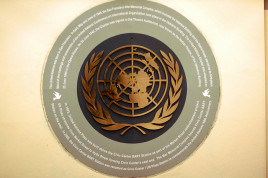The west vs ISIS: a new stage
The United Nations Security Council voted in favour of Resolution 2249 on 20 November. The France-sponsored document calls all nations to act to prevent and suppress violent actions of the Islamic State of Iraq and Syria (ISIS). It does not authorise the use of force, nor does it invoke the right to self-defence enshrined in Article 7. But it provides a strong argument for those supporting a far more intense war against ISIS.
The UN news centre reports: “The [UNSC] this evening called on all countries that can do so to take the war on terrorism to Islamic State-controlled territory in Syria and Iraq and destroy its safe haven, warning that the group intends to mount further terror attacks like those that devastated Paris and Beirut last week.”
Russia backed the resolution in part because its military actions in Syria have propelled the country to a more central international position. If its intervention expresses Vladimir Putin’s aim to restore Russia’s status as a great power, support for the resolution also reflects awareness of the Islamist challenge in Russia itself. The Chinese signed up out of concern over instability in the Gulf, the source of so much of their oil and gas, but also with their own Uyghur challenge in mind.
The practical outcome will be a concentration of the air war and wider use of special forces. Russia has substantially expanded its air forces in Syria, France is once again deploying its aircraft-carrier to the region, and Britain’s prime minister David Cameron may now get his parliamentary vote to bomb Syria.
But as the war escalates, three ominous elements present a cause for real concern.
The first is that the war against ISIS in Iraq and especially Syria is becoming ever more a western war, with Russia included in what can relentlessly be publicised by ISIS to great effect as a “crusader onslaught” on Islam (see “The Paris atrocity and after“, 14 November 2015. All four Middle East states previously involved in airstrikes in Syria – Jordan, Beirut, Saudi Arabia and the UAE – have withdrawn. Even if they can be persuaded to mount renewed attacks, these will be little more than symbolic. In any case, the view from ISIS is that such states are the willing lackeys of the crusaders.
The second is whether the heightening of military operations against ISIS, now clearly aimed at its complete physical destruction, can be remotely successful. The experience of the fifteenth-month air war is a caution here. As of 13 November, the United States-led Operation Inherent Resolve had seen attacks on 16,075 targets including 4,517 buildings and 4,942 fighting positions. Pentagon figures report that the strikes have killed 20,000 ISIS supporters, up from the 15,000 reported in July. On this basis, the 20,000-30,000 ISIS fighters that were reportedly facing the coalition a year ago should have been torn apart, yet that figure remains unchanged.
Perhaps most notable of all, the estimate of a year ago of 15,000 people going to join ISIS from eighty other countries has now been increased to 30,000 from 100 countries. In short, the persistent refrain from ISIS of being the defender against the crusaders is proving uncomfortably effective (see “Syria, another ‘all-American’ war“, 12 November 2015).
Moreover, destroying ISIS in Syria and Iraq will not be possible without ground troops, which is just what ISIS wants. And even if such destruction were possible, what would come next? Would it involve long-term western occupation of Iraq and Syria, and what effect would that produce? Would the war then extend to air and ground operations against ISIS in Libya and Yemen, and far more troops going back to Afghanistan? What about the al-Qaida groups across the Sahel, including those responsible for the attack on 20 November in Mali’s capital, Bamako?
The third element is the need for a more far-sighted view. This series of columns started immediately after 9/11 and has now run for over fourteen years, with most of the emphasis on trying to analyse the unfolding “war on terror”. If there has been one underlying concern, expressed as each of the major confrontations has evolved, it has been the persistent and dangerousreliance on the “control paradigm” and its consequences (see “The global paradigm: seeing it whole“, 1 May 2014).
The attack on Afghanistan three months after 9/11 dispersed al-Qaida and led to the Taliban melting away. The prospect for the country looked superficially bright, yet fourteen years later the war there is once again intensifying. The rapid military success against the Saddam Hussein regime in Iraq was celebrated by George W Bush’s “mission accomplished” speech on 1 May 2003, yet US troops stayed another eight years before leaving behind a rapidly evolving ISIS (see “Iraq war and ISIS; the connection“, 29 October 2015). The intervention in Libya in 2011, which had a semblance of UN approval, saw Gaddafi’s lynching and the regime’s overthrow, yet four years later Libya is a collapsed state. The cascading of arms and ideas down across the Sahel has resulted in yet more conflict, as exemplified by the Bamako operation.
An enhanced war against ISIS may be the inevitable, and indeed fully understandable, response to the appalling events in Paris a week ago. Sadly, though, that does not make it any less of a mistake. That is especially so when other paths could be taken that will do much more to prevent ISIS gaining further strength and may even end up undermining it
—————-
Professor Rogers is OpenDemocracy’s international security editor, and has been writing a weekly column on global security on OpenDemocracy since 28 September 2001
Picture: United Nations by Hugh Nelson
Tags: Iraq, ISIS, Syria, UN resolution 2249


Subscribe with…